D/LLB/20/0027: Law's Definition and Its Societal Importance
VerifiedAdded on 2021/09/08
|6
|1955
|88
Essay
AI Summary
This essay, prepared for D/LLB/20/0027, delves into the definition of 'Law' and its critical role in society. It begins by tracing the etymology of the term, highlighting its multifaceted nature and the challenges in providing a concise definition. The essay examines how society views law through the lenses of justice, morality, and reason, and how legislation, judges, and individuals interpret it. It differentiates between laws and rules, explores definitions provided by legal scholars such as Sir William Blackstone and Salmond, and discusses the relationship between law, morality, and justice. Furthermore, the essay outlines the primary and secondary sources of law, and provides a comprehensive argument for why law is indispensable for a civilized society. It details how law protects individual rights, resolves social conflicts, governs cyberspace, maintains social order, and structures public power, including its role in international relations and trade. The document emphasizes the importance of adhering to laws for the smooth functioning of society and the protection of human rights, concluding that law is a man-made body of rules essential for societal well-being.
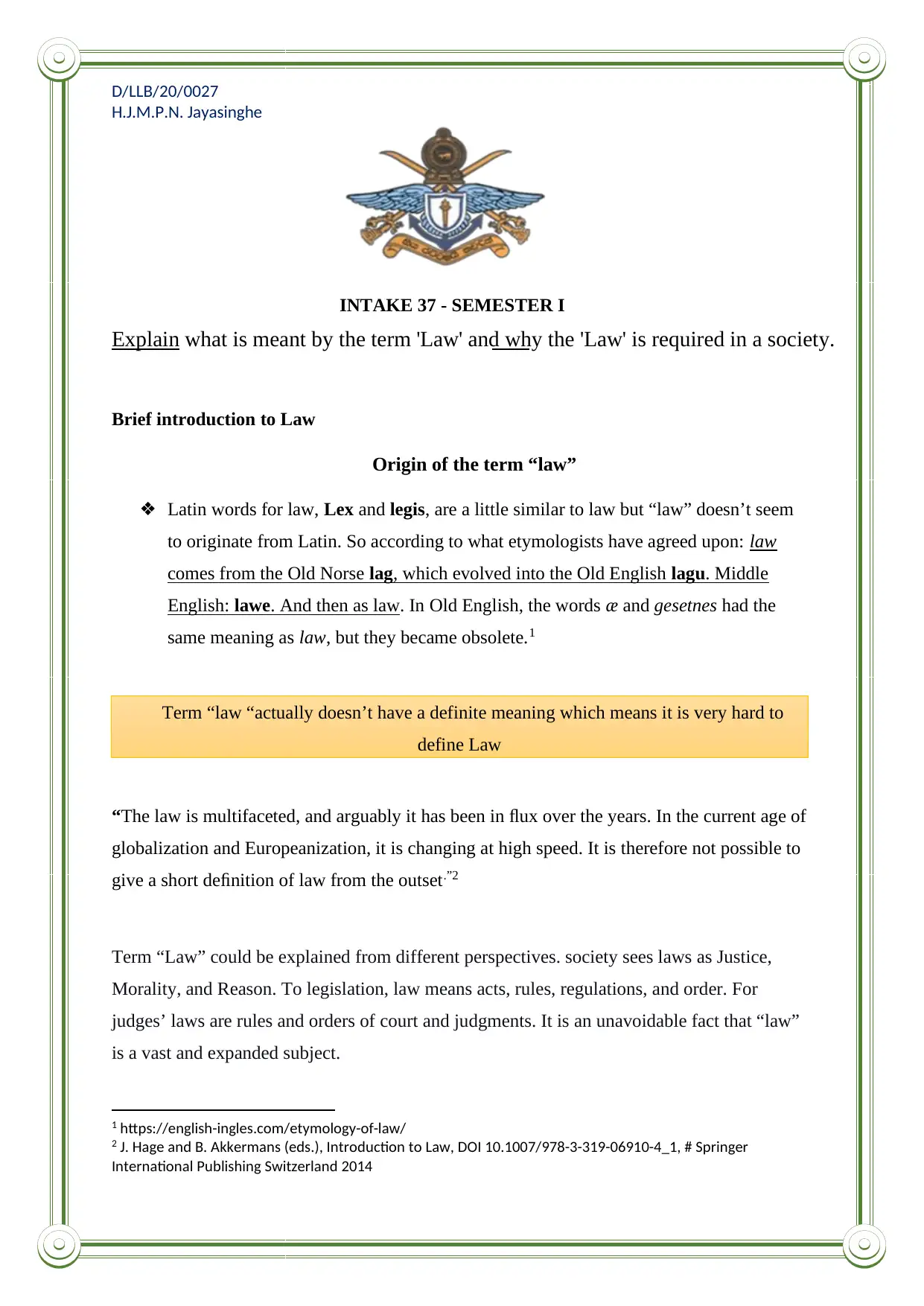
D/LLB/20/0027
H.J.M.P.N. Jayasinghe
Term “law “actually doesn’t have a definite meaning which means it is very hard to
define Law
INTAKE 37 - SEMESTER I
Explain what is meant by the term 'Law' and why the 'Law' is required in a society.
Brief introduction to Law
Origin of the term “law”
❖ Latin words for law, Lex and legis, are a little similar to law but “law” doesn’t seem
to originate from Latin. So according to what etymologists have agreed upon: law
comes from the Old Norse lag, which evolved into the Old English lagu. Middle
English: lawe. And then as law. In Old English, the words æ and gesetnes had the
same meaning as law, but they became obsolete.1
“The law is multifaceted, and arguably it has been in flux over the years. In the current age of
globalization and Europeanization, it is changing at high speed. It is therefore not possible to
give a short definition of law from the outset.”2
Term “Law” could be explained from different perspectives. society sees laws as Justice,
Morality, and Reason. To legislation, law means acts, rules, regulations, and order. For
judges’ laws are rules and orders of court and judgments. It is an unavoidable fact that “law”
is a vast and expanded subject.
1 https://english-ingles.com/etymology-of-law/
2 J. Hage and B. Akkermans (eds.), Introduction to Law, DOI 10.1007/978-3-319-06910-4_1, # Springer
International Publishing Switzerland 2014
H.J.M.P.N. Jayasinghe
Term “law “actually doesn’t have a definite meaning which means it is very hard to
define Law
INTAKE 37 - SEMESTER I
Explain what is meant by the term 'Law' and why the 'Law' is required in a society.
Brief introduction to Law
Origin of the term “law”
❖ Latin words for law, Lex and legis, are a little similar to law but “law” doesn’t seem
to originate from Latin. So according to what etymologists have agreed upon: law
comes from the Old Norse lag, which evolved into the Old English lagu. Middle
English: lawe. And then as law. In Old English, the words æ and gesetnes had the
same meaning as law, but they became obsolete.1
“The law is multifaceted, and arguably it has been in flux over the years. In the current age of
globalization and Europeanization, it is changing at high speed. It is therefore not possible to
give a short definition of law from the outset.”2
Term “Law” could be explained from different perspectives. society sees laws as Justice,
Morality, and Reason. To legislation, law means acts, rules, regulations, and order. For
judges’ laws are rules and orders of court and judgments. It is an unavoidable fact that “law”
is a vast and expanded subject.
1 https://english-ingles.com/etymology-of-law/
2 J. Hage and B. Akkermans (eds.), Introduction to Law, DOI 10.1007/978-3-319-06910-4_1, # Springer
International Publishing Switzerland 2014
Paraphrase This Document
Need a fresh take? Get an instant paraphrase of this document with our AI Paraphraser
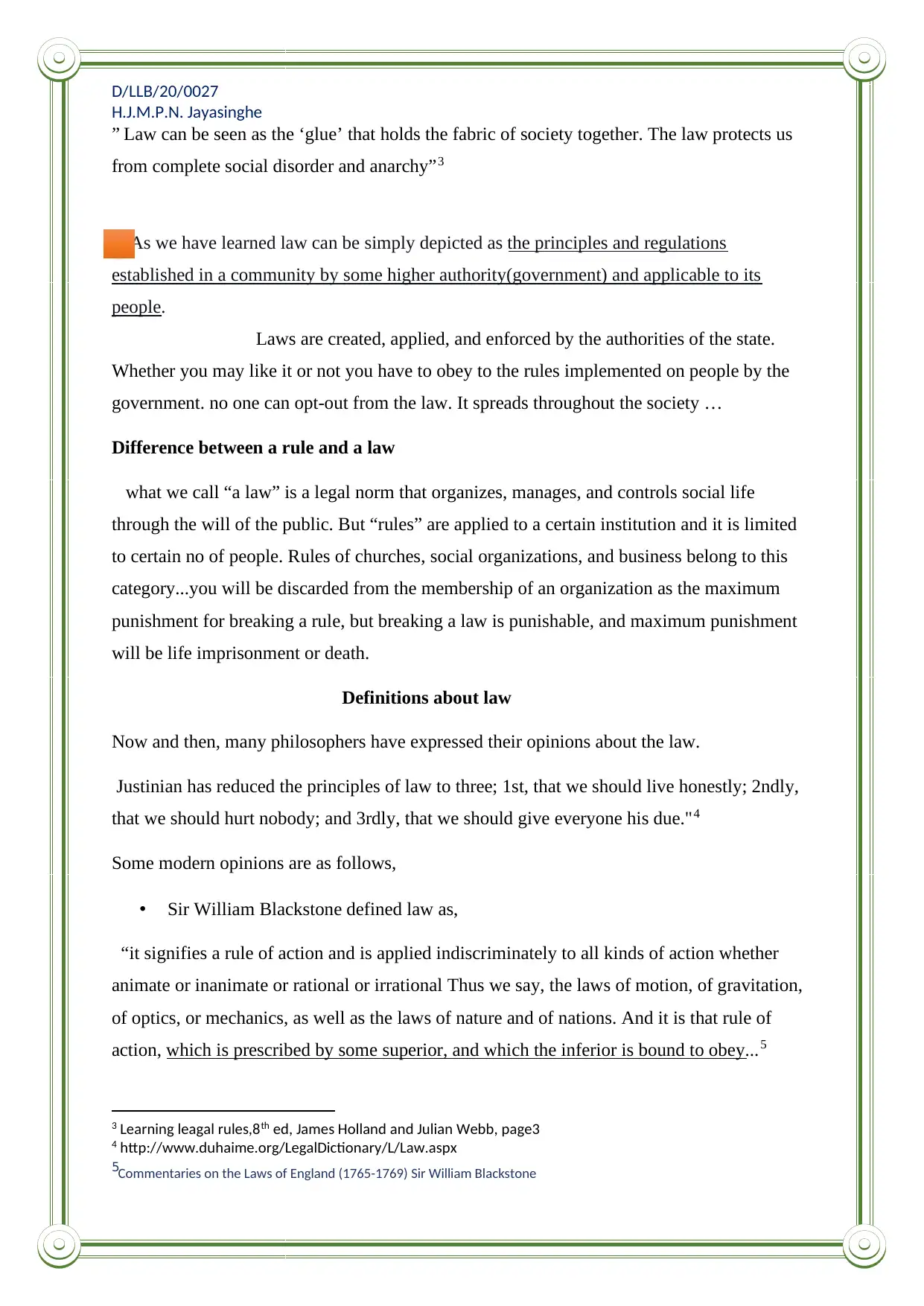
D/LLB/20/0027
H.J.M.P.N. Jayasinghe
” Law can be seen as the ‘glue’ that holds the fabric of society together. The law protects us
from complete social disorder and anarchy”3
As we have learned law can be simply depicted as the principles and regulations
established in a community by some higher authority(government) and applicable to its
people.
Laws are created, applied, and enforced by the authorities of the state.
Whether you may like it or not you have to obey to the rules implemented on people by the
government. no one can opt-out from the law. It spreads throughout the society …
Difference between a rule and a law
what we call “a law” is a legal norm that organizes, manages, and controls social life
through the will of the public. But “rules” are applied to a certain institution and it is limited
to certain no of people. Rules of churches, social organizations, and business belong to this
category...you will be discarded from the membership of an organization as the maximum
punishment for breaking a rule, but breaking a law is punishable, and maximum punishment
will be life imprisonment or death.
Definitions about law
Now and then, many philosophers have expressed their opinions about the law.
Justinian has reduced the principles of law to three; 1st, that we should live honestly; 2ndly,
that we should hurt nobody; and 3rdly, that we should give everyone his due."4
Some modern opinions are as follows,
• Sir William Blackstone defined law as,
“it signifies a rule of action and is applied indiscriminately to all kinds of action whether
animate or inanimate or rational or irrational Thus we say, the laws of motion, of gravitation,
of optics, or mechanics, as well as the laws of nature and of nations. And it is that rule of
action, which is prescribed by some superior, and which the inferior is bound to obey...5
3 Learning leagal rules,8th ed, James Holland and Julian Webb, page3
4 http://www.duhaime.org/LegalDictionary/L/Law.aspx
5Commentaries on the Laws of England (1765-1769) Sir William Blackstone
H.J.M.P.N. Jayasinghe
” Law can be seen as the ‘glue’ that holds the fabric of society together. The law protects us
from complete social disorder and anarchy”3
As we have learned law can be simply depicted as the principles and regulations
established in a community by some higher authority(government) and applicable to its
people.
Laws are created, applied, and enforced by the authorities of the state.
Whether you may like it or not you have to obey to the rules implemented on people by the
government. no one can opt-out from the law. It spreads throughout the society …
Difference between a rule and a law
what we call “a law” is a legal norm that organizes, manages, and controls social life
through the will of the public. But “rules” are applied to a certain institution and it is limited
to certain no of people. Rules of churches, social organizations, and business belong to this
category...you will be discarded from the membership of an organization as the maximum
punishment for breaking a rule, but breaking a law is punishable, and maximum punishment
will be life imprisonment or death.
Definitions about law
Now and then, many philosophers have expressed their opinions about the law.
Justinian has reduced the principles of law to three; 1st, that we should live honestly; 2ndly,
that we should hurt nobody; and 3rdly, that we should give everyone his due."4
Some modern opinions are as follows,
• Sir William Blackstone defined law as,
“it signifies a rule of action and is applied indiscriminately to all kinds of action whether
animate or inanimate or rational or irrational Thus we say, the laws of motion, of gravitation,
of optics, or mechanics, as well as the laws of nature and of nations. And it is that rule of
action, which is prescribed by some superior, and which the inferior is bound to obey...5
3 Learning leagal rules,8th ed, James Holland and Julian Webb, page3
4 http://www.duhaime.org/LegalDictionary/L/Law.aspx
5Commentaries on the Laws of England (1765-1769) Sir William Blackstone
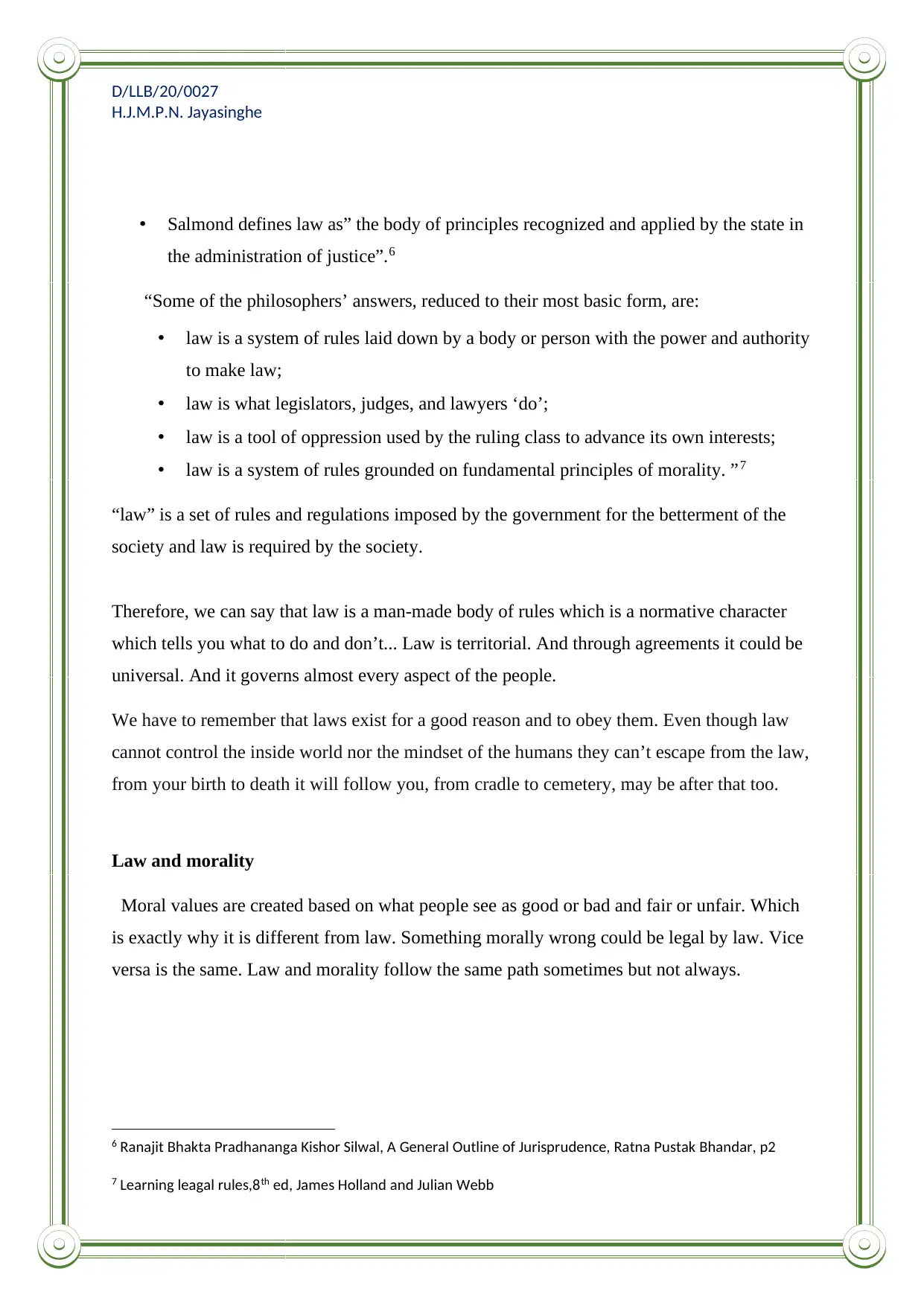
D/LLB/20/0027
H.J.M.P.N. Jayasinghe
• Salmond defines law as” the body of principles recognized and applied by the state in
the administration of justice”.6
“Some of the philosophers’ answers, reduced to their most basic form, are:
• law is a system of rules laid down by a body or person with the power and authority
to make law;
• law is what legislators, judges, and lawyers ‘do’;
• law is a tool of oppression used by the ruling class to advance its own interests;
• law is a system of rules grounded on fundamental principles of morality. ”7
“law” is a set of rules and regulations imposed by the government for the betterment of the
society and law is required by the society.
Therefore, we can say that law is a man-made body of rules which is a normative character
which tells you what to do and don’t... Law is territorial. And through agreements it could be
universal. And it governs almost every aspect of the people.
We have to remember that laws exist for a good reason and to obey them. Even though law
cannot control the inside world nor the mindset of the humans they can’t escape from the law,
from your birth to death it will follow you, from cradle to cemetery, may be after that too.
Law and morality
Moral values are created based on what people see as good or bad and fair or unfair. Which
is exactly why it is different from law. Something morally wrong could be legal by law. Vice
versa is the same. Law and morality follow the same path sometimes but not always.
6 Ranajit Bhakta Pradhananga Kishor Silwal, A General Outline of Jurisprudence, Ratna Pustak Bhandar, p2
7 Learning leagal rules,8th ed, James Holland and Julian Webb
H.J.M.P.N. Jayasinghe
• Salmond defines law as” the body of principles recognized and applied by the state in
the administration of justice”.6
“Some of the philosophers’ answers, reduced to their most basic form, are:
• law is a system of rules laid down by a body or person with the power and authority
to make law;
• law is what legislators, judges, and lawyers ‘do’;
• law is a tool of oppression used by the ruling class to advance its own interests;
• law is a system of rules grounded on fundamental principles of morality. ”7
“law” is a set of rules and regulations imposed by the government for the betterment of the
society and law is required by the society.
Therefore, we can say that law is a man-made body of rules which is a normative character
which tells you what to do and don’t... Law is territorial. And through agreements it could be
universal. And it governs almost every aspect of the people.
We have to remember that laws exist for a good reason and to obey them. Even though law
cannot control the inside world nor the mindset of the humans they can’t escape from the law,
from your birth to death it will follow you, from cradle to cemetery, may be after that too.
Law and morality
Moral values are created based on what people see as good or bad and fair or unfair. Which
is exactly why it is different from law. Something morally wrong could be legal by law. Vice
versa is the same. Law and morality follow the same path sometimes but not always.
6 Ranajit Bhakta Pradhananga Kishor Silwal, A General Outline of Jurisprudence, Ratna Pustak Bhandar, p2
7 Learning leagal rules,8th ed, James Holland and Julian Webb
⊘ This is a preview!⊘
Do you want full access?
Subscribe today to unlock all pages.

Trusted by 1+ million students worldwide
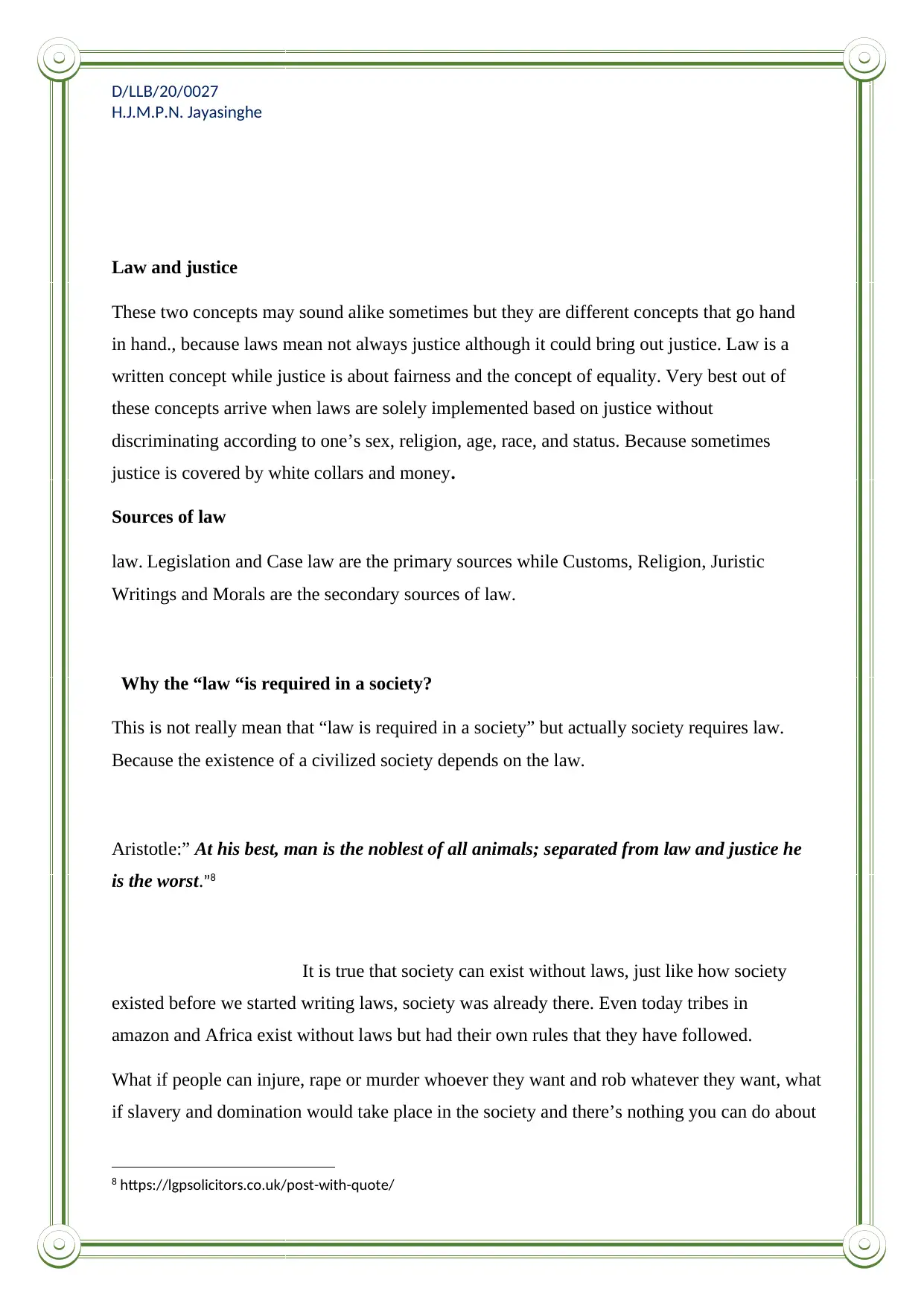
D/LLB/20/0027
H.J.M.P.N. Jayasinghe
Law and justice
These two concepts may sound alike sometimes but they are different concepts that go hand
in hand., because laws mean not always justice although it could bring out justice. Law is a
written concept while justice is about fairness and the concept of equality. Very best out of
these concepts arrive when laws are solely implemented based on justice without
discriminating according to one’s sex, religion, age, race, and status. Because sometimes
justice is covered by white collars and money.
Sources of law
law. Legislation and Case law are the primary sources while Customs, Religion, Juristic
Writings and Morals are the secondary sources of law.
Why the “law “is required in a society?
This is not really mean that “law is required in a society” but actually society requires law.
Because the existence of a civilized society depends on the law.
Aristotle:” At his best, man is the noblest of all animals; separated from law and justice he
is the worst.”8
It is true that society can exist without laws, just like how society
existed before we started writing laws, society was already there. Even today tribes in
amazon and Africa exist without laws but had their own rules that they have followed.
What if people can injure, rape or murder whoever they want and rob whatever they want, what
if slavery and domination would take place in the society and there’s nothing you can do about
8 https://lgpsolicitors.co.uk/post-with-quote/
H.J.M.P.N. Jayasinghe
Law and justice
These two concepts may sound alike sometimes but they are different concepts that go hand
in hand., because laws mean not always justice although it could bring out justice. Law is a
written concept while justice is about fairness and the concept of equality. Very best out of
these concepts arrive when laws are solely implemented based on justice without
discriminating according to one’s sex, religion, age, race, and status. Because sometimes
justice is covered by white collars and money.
Sources of law
law. Legislation and Case law are the primary sources while Customs, Religion, Juristic
Writings and Morals are the secondary sources of law.
Why the “law “is required in a society?
This is not really mean that “law is required in a society” but actually society requires law.
Because the existence of a civilized society depends on the law.
Aristotle:” At his best, man is the noblest of all animals; separated from law and justice he
is the worst.”8
It is true that society can exist without laws, just like how society
existed before we started writing laws, society was already there. Even today tribes in
amazon and Africa exist without laws but had their own rules that they have followed.
What if people can injure, rape or murder whoever they want and rob whatever they want, what
if slavery and domination would take place in the society and there’s nothing you can do about
8 https://lgpsolicitors.co.uk/post-with-quote/
Paraphrase This Document
Need a fresh take? Get an instant paraphrase of this document with our AI Paraphraser
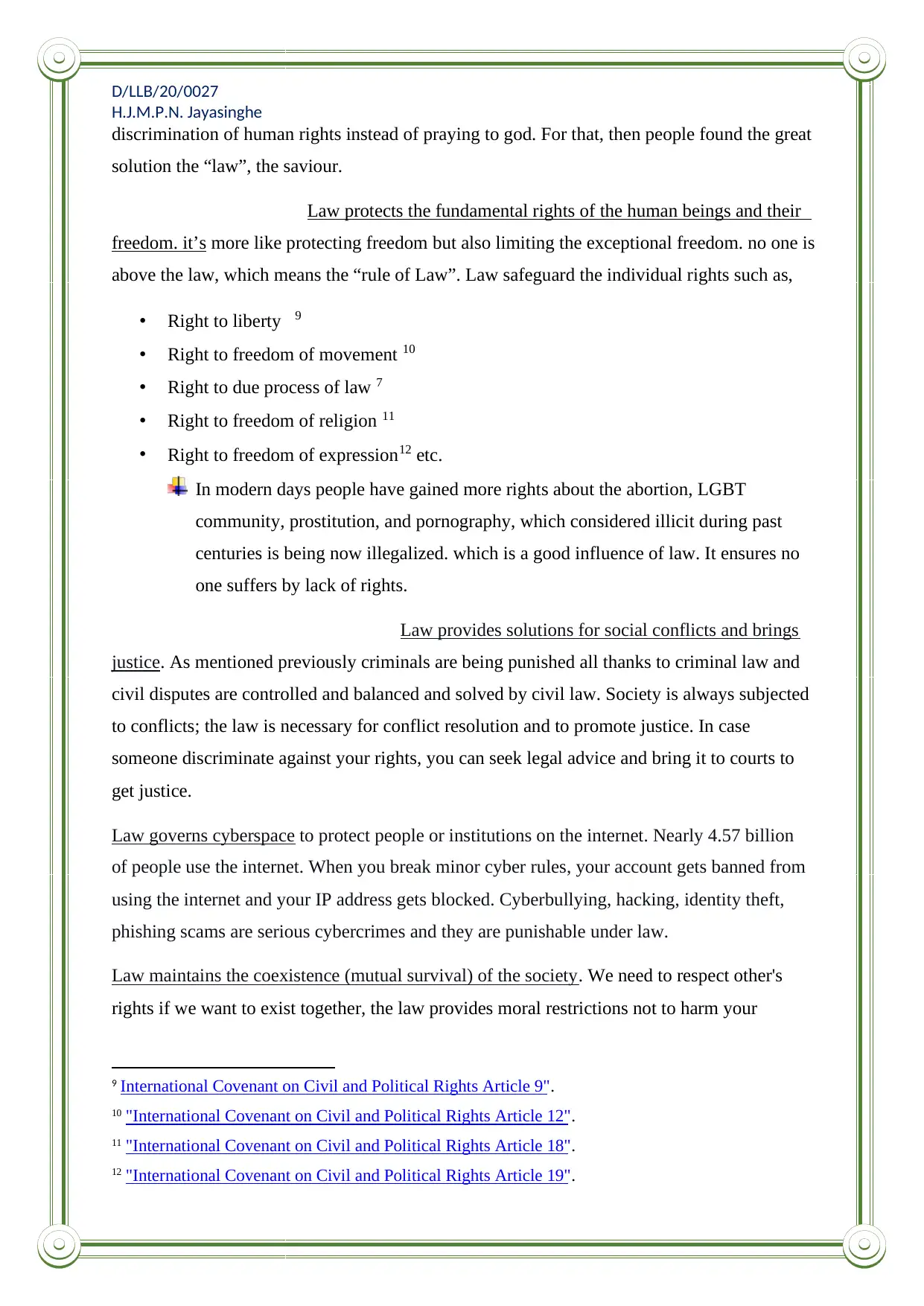
D/LLB/20/0027
H.J.M.P.N. Jayasinghe
discrimination of human rights instead of praying to god. For that, then people found the great
solution the “law”, the saviour.
Law protects the fundamental rights of the human beings and their
freedom. it’s more like protecting freedom but also limiting the exceptional freedom. no one is
above the law, which means the “rule of Law”. Law safeguard the individual rights such as,
• Right to liberty 9
• Right to freedom of movement 10
• Right to due process of law 7
• Right to freedom of religion 11
• Right to freedom of expression12 etc.
In modern days people have gained more rights about the abortion, LGBT
community, prostitution, and pornography, which considered illicit during past
centuries is being now illegalized. which is a good influence of law. It ensures no
one suffers by lack of rights.
Law provides solutions for social conflicts and brings
justice. As mentioned previously criminals are being punished all thanks to criminal law and
civil disputes are controlled and balanced and solved by civil law. Society is always subjected
to conflicts; the law is necessary for conflict resolution and to promote justice. In case
someone discriminate against your rights, you can seek legal advice and bring it to courts to
get justice.
Law governs cyberspace to protect people or institutions on the internet. Nearly 4.57 billion
of people use the internet. When you break minor cyber rules, your account gets banned from
using the internet and your IP address gets blocked. Cyberbullying, hacking, identity theft,
phishing scams are serious cybercrimes and they are punishable under law.
Law maintains the coexistence (mutual survival) of the society. We need to respect other's
rights if we want to exist together, the law provides moral restrictions not to harm your
9 International Covenant on Civil and Political Rights Article 9".
10 "International Covenant on Civil and Political Rights Article 12".
11 "International Covenant on Civil and Political Rights Article 18".
12 "International Covenant on Civil and Political Rights Article 19".
H.J.M.P.N. Jayasinghe
discrimination of human rights instead of praying to god. For that, then people found the great
solution the “law”, the saviour.
Law protects the fundamental rights of the human beings and their
freedom. it’s more like protecting freedom but also limiting the exceptional freedom. no one is
above the law, which means the “rule of Law”. Law safeguard the individual rights such as,
• Right to liberty 9
• Right to freedom of movement 10
• Right to due process of law 7
• Right to freedom of religion 11
• Right to freedom of expression12 etc.
In modern days people have gained more rights about the abortion, LGBT
community, prostitution, and pornography, which considered illicit during past
centuries is being now illegalized. which is a good influence of law. It ensures no
one suffers by lack of rights.
Law provides solutions for social conflicts and brings
justice. As mentioned previously criminals are being punished all thanks to criminal law and
civil disputes are controlled and balanced and solved by civil law. Society is always subjected
to conflicts; the law is necessary for conflict resolution and to promote justice. In case
someone discriminate against your rights, you can seek legal advice and bring it to courts to
get justice.
Law governs cyberspace to protect people or institutions on the internet. Nearly 4.57 billion
of people use the internet. When you break minor cyber rules, your account gets banned from
using the internet and your IP address gets blocked. Cyberbullying, hacking, identity theft,
phishing scams are serious cybercrimes and they are punishable under law.
Law maintains the coexistence (mutual survival) of the society. We need to respect other's
rights if we want to exist together, the law provides moral restrictions not to harm your
9 International Covenant on Civil and Political Rights Article 9".
10 "International Covenant on Civil and Political Rights Article 12".
11 "International Covenant on Civil and Political Rights Article 18".
12 "International Covenant on Civil and Political Rights Article 19".
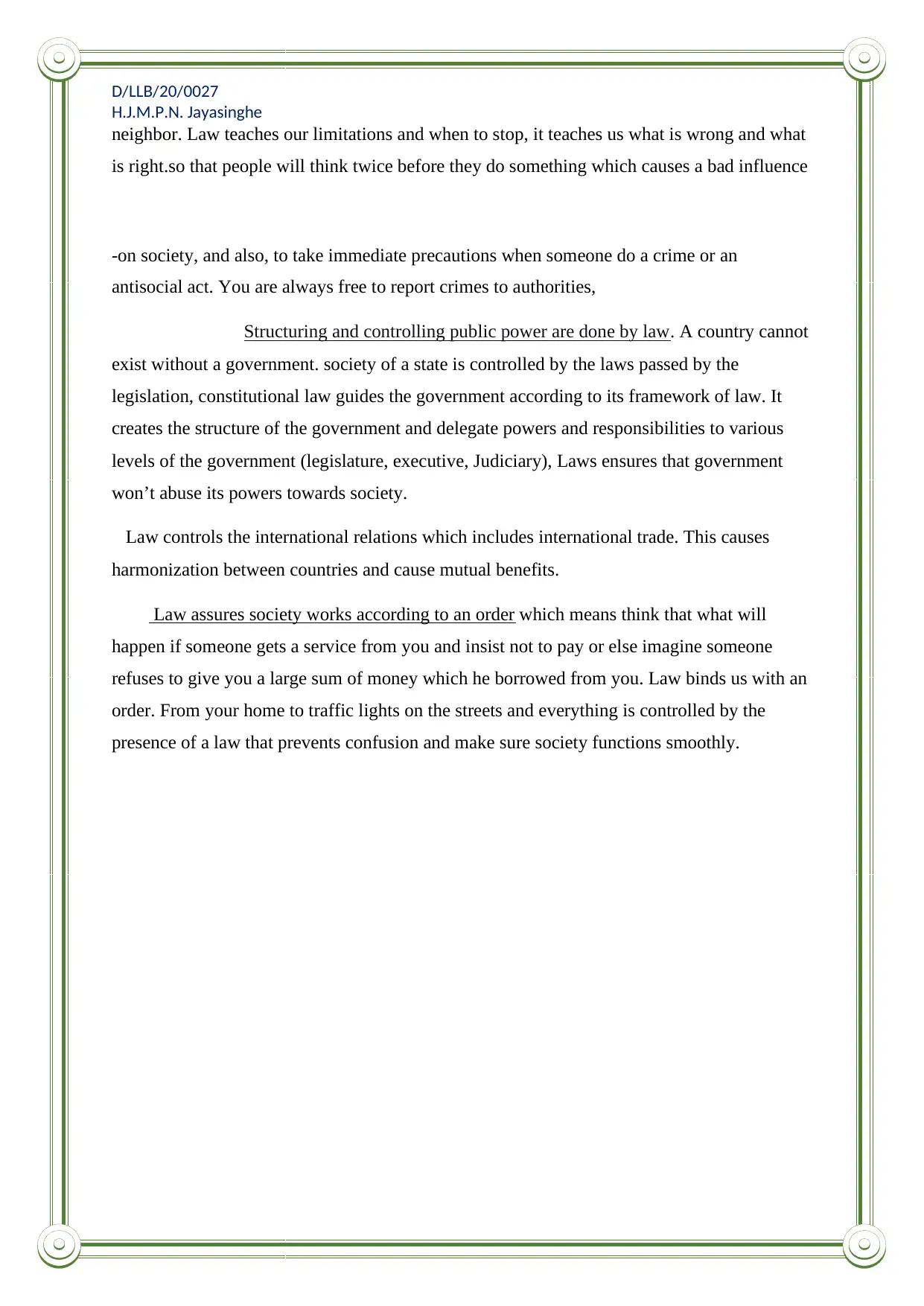
D/LLB/20/0027
H.J.M.P.N. Jayasinghe
neighbor. Law teaches our limitations and when to stop, it teaches us what is wrong and what
is right.so that people will think twice before they do something which causes a bad influence
-on society, and also, to take immediate precautions when someone do a crime or an
antisocial act. You are always free to report crimes to authorities,
Structuring and controlling public power are done by law. A country cannot
exist without a government. society of a state is controlled by the laws passed by the
legislation, constitutional law guides the government according to its framework of law. It
creates the structure of the government and delegate powers and responsibilities to various
levels of the government (legislature, executive, Judiciary), Laws ensures that government
won’t abuse its powers towards society.
Law controls the international relations which includes international trade. This causes
harmonization between countries and cause mutual benefits.
Law assures society works according to an order which means think that what will
happen if someone gets a service from you and insist not to pay or else imagine someone
refuses to give you a large sum of money which he borrowed from you. Law binds us with an
order. From your home to traffic lights on the streets and everything is controlled by the
presence of a law that prevents confusion and make sure society functions smoothly.
H.J.M.P.N. Jayasinghe
neighbor. Law teaches our limitations and when to stop, it teaches us what is wrong and what
is right.so that people will think twice before they do something which causes a bad influence
-on society, and also, to take immediate precautions when someone do a crime or an
antisocial act. You are always free to report crimes to authorities,
Structuring and controlling public power are done by law. A country cannot
exist without a government. society of a state is controlled by the laws passed by the
legislation, constitutional law guides the government according to its framework of law. It
creates the structure of the government and delegate powers and responsibilities to various
levels of the government (legislature, executive, Judiciary), Laws ensures that government
won’t abuse its powers towards society.
Law controls the international relations which includes international trade. This causes
harmonization between countries and cause mutual benefits.
Law assures society works according to an order which means think that what will
happen if someone gets a service from you and insist not to pay or else imagine someone
refuses to give you a large sum of money which he borrowed from you. Law binds us with an
order. From your home to traffic lights on the streets and everything is controlled by the
presence of a law that prevents confusion and make sure society functions smoothly.
⊘ This is a preview!⊘
Do you want full access?
Subscribe today to unlock all pages.

Trusted by 1+ million students worldwide
1 out of 6
Related Documents
Your All-in-One AI-Powered Toolkit for Academic Success.
+13062052269
info@desklib.com
Available 24*7 on WhatsApp / Email
![[object Object]](/_next/static/media/star-bottom.7253800d.svg)
Unlock your academic potential
Copyright © 2020–2026 A2Z Services. All Rights Reserved. Developed and managed by ZUCOL.




